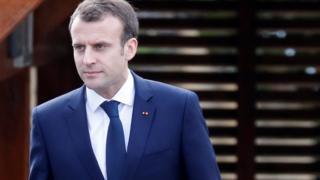Syria 'chemical attack': France's President Macron says he has proof
 Image copyright
Reuters
Image copyright
Reuters
France's President Emmanuel Macron says he has "proof" that the Syrian government attacked the town of Douma with chemical weapons last weekend.
He said he would decide "in due course" whether to strike Syria.
Western states are thought to be preparing for missile strikes in response to the alleged attack.
In Russia, Syria's main military ally, Kremlin spokesman Dmitry Peskov urged against "any steps which could lead to an escalation of tensions".
US President Donald Trump, who said on Wednesday that missiles were "coming", has now tweeted that he "never said when".
- US weighs military response over Syria
- Syria 'chemical attack': What we know
- Why is there a war in Syria?
It "could be very soon or not so soon at all", said the president, who has cancelled a planned trip to stay in the US with his defence secretary, and who has been canvassing support for strikes from the leaders of other countries including the UK and France.
Did Macron offer proof?
The French leader previously said any strikes would target the Syrian government's "chemical capabilities".
He did not give the source of his information but said: "We have proof that last week chemical weapons, at least chlorine, were used by the regime of Bashar al-Assad."
Asked in a TV interview whether France would join strikes on Syria, he said: "We will need to take decisions in due course, when we judge it most useful and effective.
"France will not allow any escalation that could harm the stability of the region as a whole but we can't let regimes that think they can do everything they want, including the worst things that violate international law, to act."
What happened in Douma?
Activists, rescue workers and medics say dozens of people died when government aircraft dropped bombs filled with toxic chemicals on the formerly rebel-held town of Douma on Saturday.
But President Bashar al-Assad's government - which receives military backing from Russia - denies being behind any chemical attack.
The Syrian-American Medical Society (Sams), which operates in rebel-held areas, said more than 500 people had been treated for symptoms "indicative of exposure to a chemical agent".
On Wednesday, the UN's World Health Organization demanded access to verify reports from its partners, which include Sams, that 70 people had died - including 43 who showed "symptoms consistent with exposure to highly toxic chemicals".
Russia has described the reports of the chemical attack as a "provocation" designed to justify Western intervention against its ally, and accused militant rebels of fabricating it.
Do you have a question about the conflict in Syria? Or the diplomatic discussions over it? You can send it to haveyoursay@bbc.co.uk.
You can also contact us in the following ways:
- Tweet: @BBC_HaveYourSay
- WhatsApp: +44 7555 173285
- Text an SMS or MMS to 61124 (UK)
- Please read our terms & conditions